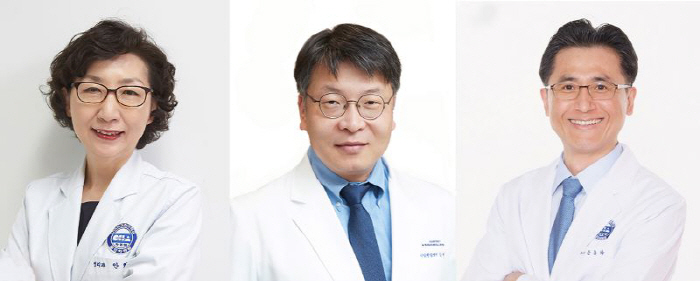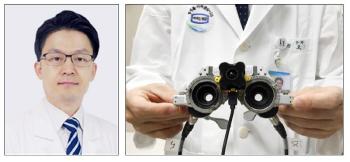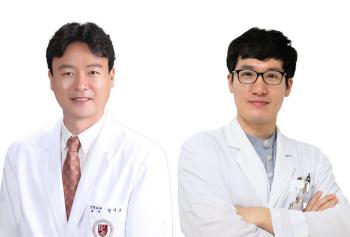Bundang Cha Hospital Cancer Center selects a national project for advanced regenerative medical clinical research for patients with recurrent ovarian cancer
May 20, 2025
Cha Medical University Bundang Cha Hospital (Director Yoon Sang-wook) announced that a clinical study of tumor-invasive lymphocyte treatment for patients with recurrent ovarian cancer developed by a team of professors Ahn Hee-jung (pathology department), Park Hyun (female cancer center), and Moon Yong-hwa (blood oncology department) at the cancer center was approved by the Ministry of Health and Welfare as an advanced regenerative medical study and selected as a national project.
CHA-TIL cells for ovarian cancer treatment developed by professors Ahn Hee-jung, Park Hyun, and Moon Yong-hwa are cell therapy using TIL (Tumor Infiltrating Lymphocytes), a tumor-infiltrating lymphocytes that are gathered around cancer cells, and utilized the characteristics of tumor-infiltrating lymphocytes to efficiently recognize various antigens present in cancer cells.
CHA-TIL cells are second-generation TIL cell therapies with enhanced anti-tumor activity in a way that stimulates with specific peptides overexpressed in ovarian cancer and induces T cell activation using specific antibody techniques. As the activation function is strengthened, anti-tumor immune responses in the body increase when administered to cancer patients, and cancer can be treated by killing tumor cells directly.
Ovarian cancer has the highest mortality rate among female cancers and is difficult to diagnose early, so about 70% of them are found in the advanced stage (3rd to 4th stages).
In addition, 85% of patients with epithelial ovarian cancer who received first-line treatment are refractory cancers that recur, with a 5-year survival rate of 64.7% and a 5-year survival rate of ovarian cancer found in stage 4. Taxol and carboplatin combination therapy, which are used as the primary standard treatment after surgery, is toxic and has a very high recurrence frequency of 75-80%, and there is a limit to the occurrence of anticancer drug resistance in case of recurrence.
As an alternative treatment, PARP inhibitors are highly responsive in BRCA mutant ovarian cancer and are used as maintenance therapy, but the proportion of BRCA mutations is as low as 10-20%, so there is a limit to treating most ovarian cancer patients, so it is urgent to develop new treatments to increase the survival rate of ovarian cancer patients.
CHA-TIL cells isolate T cells with superior ability to penetrate a patient's tumor and fight cancer cells?It has the advantage of being able to identify and attack only tumor cells by culturing and proliferating, and aims to extend the survival period of patients with recurrent ovarian cancer. Bundang Cha Hospital is scheduled to conduct clinical trials for ovarian cancer patients using CHA-TIL cells from June. The head of the research is Professor Moon Yong-hwa of the Department of Hematologic Oncology at Bundang Cha Hospital.
Professor Ahn Hee-jung of the pathology department at Bundang Cha Hospital, the main developer of CHA-TIL cells, said "Unlike conventional chemotherapy, this study does not attack normal cells, so there are fewer side effects of chemotherapy and has excellent ability to target cancer cells, so it is expected to be developed as a personalized treatment for various solid cancers as well as ovarian cancer."
Meanwhile, Bundang Cha Hospital, which was selected as a state-designated research-oriented hospital in 2013, is establishing itself as a representative institution in Korea in refractory and severe treatment research by conducting various studies on refractory diseases (nervous system, eye diseases, musculoskeletal diseases), as well as cancer, infertility, and aging using stem cell treatment technology.
CHA-TIL cells for ovarian cancer treatment developed by professors Ahn Hee-jung, Park Hyun, and Moon Yong-hwa are cell therapy using TIL (Tumor Infiltrating Lymphocytes), a tumor-infiltrating lymphocytes that are gathered around cancer cells, and utilized the characteristics of tumor-infiltrating lymphocytes to efficiently recognize various antigens present in cancer cells.
CHA-TIL cells are second-generation TIL cell therapies with enhanced anti-tumor activity in a way that stimulates with specific peptides overexpressed in ovarian cancer and induces T cell activation using specific antibody techniques. As the activation function is strengthened, anti-tumor immune responses in the body increase when administered to cancer patients, and cancer can be treated by killing tumor cells directly.
Ovarian cancer has the highest mortality rate among female cancers and is difficult to diagnose early, so about 70% of them are found in the advanced stage (3rd to 4th stages).
In addition, 85% of patients with epithelial ovarian cancer who received first-line treatment are refractory cancers that recur, with a 5-year survival rate of 64.7% and a 5-year survival rate of ovarian cancer found in stage 4. Taxol and carboplatin combination therapy, which are used as the primary standard treatment after surgery, is toxic and has a very high recurrence frequency of 75-80%, and there is a limit to the occurrence of anticancer drug resistance in case of recurrence.
As an alternative treatment, PARP inhibitors are highly responsive in BRCA mutant ovarian cancer and are used as maintenance therapy, but the proportion of BRCA mutations is as low as 10-20%, so there is a limit to treating most ovarian cancer patients, so it is urgent to develop new treatments to increase the survival rate of ovarian cancer patients.
CHA-TIL cells isolate T cells with superior ability to penetrate a patient's tumor and fight cancer cells?It has the advantage of being able to identify and attack only tumor cells by culturing and proliferating, and aims to extend the survival period of patients with recurrent ovarian cancer. Bundang Cha Hospital is scheduled to conduct clinical trials for ovarian cancer patients using CHA-TIL cells from June. The head of the research is Professor Moon Yong-hwa of the Department of Hematologic Oncology at Bundang Cha Hospital.
Professor Ahn Hee-jung of the pathology department at Bundang Cha Hospital, the main developer of CHA-TIL cells, said "Unlike conventional chemotherapy, this study does not attack normal cells, so there are fewer side effects of chemotherapy and has excellent ability to target cancer cells, so it is expected to be developed as a personalized treatment for various solid cancers as well as ovarian cancer."
Meanwhile, Bundang Cha Hospital, which was selected as a state-designated research-oriented hospital in 2013, is establishing itself as a representative institution in Korea in refractory and severe treatment research by conducting various studies on refractory diseases (nervous system, eye diseases, musculoskeletal diseases), as well as cancer, infertility, and aging using stem cell treatment technology.
|
This article was translated by Naver AI translator.














